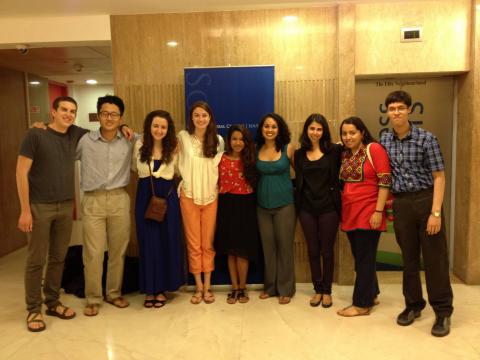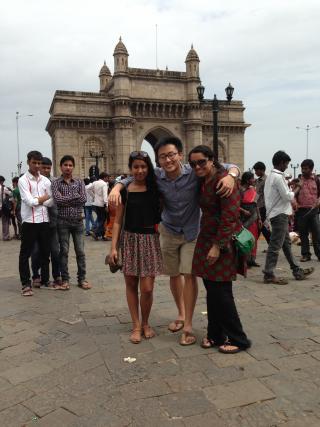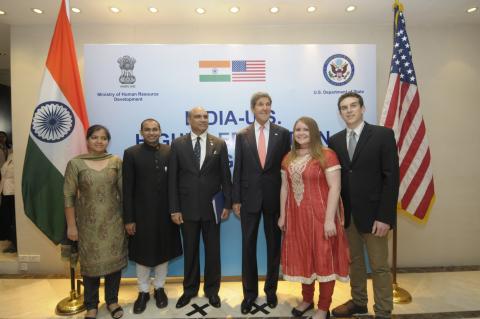Hannah Sotnick ’15 is interested in foreign languages and cultures and says she has always wanted to work abroad after graduation. Last year, as a sophomore, she started looking for a way to work or intern abroad for the upcoming summer. “I was having difficulty finding a way to do so that would allow me a source of income to pay for housing and so forth,” she says. Then a career counselor told her about Columbia Experience Overseas (CEO), a Center for Career Education (CCE) program that sends students to foreign cities to live together and work in eight-week internships. Sotnick applied for a position in Mumbai, was interviewed by her would-be supervisor over Skype and was offered the job.
 Gathering at the Columbia Global Center in Mumbai were (left to right) Ben Harris ’14, David Kang ’15, Hannah Sotnick ’15, Allison Kammert ’15, Meghna Mukherjee ’15, Srilekha Jayanthi ’11, Anjali Chowfla ’11 SIPA, Doreen Mohammed ’15 and Shrey Chandra ’15. Photo: Courtesy of the Center for Career Education
Gathering at the Columbia Global Center in Mumbai were (left to right) Ben Harris ’14, David Kang ’15, Hannah Sotnick ’15, Allison Kammert ’15, Meghna Mukherjee ’15, Srilekha Jayanthi ’11, Anjali Chowfla ’11 SIPA, Doreen Mohammed ’15 and Shrey Chandra ’15. Photo: Courtesy of the Center for Career Education
“I was extremely excited after learning more about the Marg Foundation — a nonprofit art publisher that promotes Indian art and culture — and the internship,” Sotnick says. She was a marketing intern and shared a corporate apartment, provided by Columbia, with the seven other Columbia interns in Mumbai. With some others in the group, she extended her stay to travel for nine days in the northwest state of Rajasthan. She returned to the United States with valuable international work experience and says she has clarified her career vision: “The experience affirmed my interest in writing and publishing and working abroad as well as expanded my interest in working in a nonprofit.”
Since 2007, CCE has been connecting with employers and alumni in international locations to secure summer internships for rising juniors and seniors. CCE’s role includes internship development, arranging for housing and connecting with local alumni in cities including Amman, Beijing, Hong Kong, London, Shanghai, Singapore and, new in 2013, Mumbai and Bangalore. This year 64 students worked abroad through CEO.
“The CEO program was designed to provide students with accessible international internship opportunities that leverage Columbia’s growing global presence,” says Kavita Sharma, dean of CCE. “Employers are looking for candidates who are adaptable and can relate to people from all walks of life. Interning abroad contributes significantly not only to students’ professional development but also to their personal and social development. They become cross-culturally savvy and aware, skills that they leverage when they return to campus and in their future professional lives.”
“Interning abroad contributes significantly not only to students’ professional development but also to their personal and social development.” — Kavita Sharma
The CEO program was extended to Bangalore and Mumbai as part of the U.S. Department of State’s Passport to India initiative, which seeks to increase the number of American students going to India for study and work. President Barack Obama ’83 has declared India a defining partner of the 21st century yet, as the State Department website notes, “The pool of Americans ready to manage the growing political, economic and cultural ties between the U.S. and India is small. This is in part due to limited opportunities for American students in India.” In 2009–10, 2,690 Americans studied abroad in India, while 104,879 Indians studied in the U.S., according to the State Department. Citi provided start-up funding for the CEO Mumbai and Banglore program.
After CCE’s outreach specialists develop relationships with employers that yield internship opportunities, students are recruited to the CEO internships through listings in the campus’ online jobs database, LionSHARE, and through a marketing campaign that includes email, in-person information sessions and one-on-one counseling meetings. The information sessions help students understand the available opportunities and the realities of working abroad, and feature a panel of past CEO participants. “Students love to hear firsthand accounts from their peers,” says Heather Perceval, CCE’s associate dean for experiential education. “Knowing that their peers have navigated international internships and listening to their successes and challenges makes others feel that they, too, can take up a CEO internship.”
 Sightseeing at the Gateway of India were (left to right) Meghna Mukherjee ’15, David Kang ’15 and Doreen Mohammed ’15. Photo: Courtesy of Meghna Mukherjee ’15
Students apply directly to employers and are interviewed by telephone or Skype. CCE arranges and pays for housing for all interns, and covers visa and travel costs according to financial need. Before departure, CCE holds an all-day orientation that reviews health and safety, offers tips on having a successful internship and discusses cross-cultural communication skills. Breakout sessions are city specific.
Sightseeing at the Gateway of India were (left to right) Meghna Mukherjee ’15, David Kang ’15 and Doreen Mohammed ’15. Photo: Courtesy of Meghna Mukherjee ’15
Students apply directly to employers and are interviewed by telephone or Skype. CCE arranges and pays for housing for all interns, and covers visa and travel costs according to financial need. Before departure, CCE holds an all-day orientation that reviews health and safety, offers tips on having a successful internship and discusses cross-cultural communication skills. Breakout sessions are city specific.
Among the 11 students who interned in India through CEO this summer were one from GS, two from Engineering and eight from the College. The College students were all in Mumbai, including Doreen Mohammad ’15 from Jamaica, Queens, who had never left the United States; Shrey Chandra ’15, who was born in Mumbai and hadn’t been back since his family emigrated when he was 8; and David Kang ’15, a Korean-American who envisions someday running for Congress. “If the stipend were not available or housing not provided, I certainly would not have been able to have my experiences in India,” says Kang, who interned at a law firm. “I’m infinitely grateful.”
CCE arranges an on-site orientation and alumni event upon arrival in cities that have a Columbia Global Center — this year, that meant Amman, Beijing and Mumbai. “That was really helpful and made us all feel very welcomed and aware of the Columbia community in Mumbai,” Sotnick says.
The interns also are connected with Columbia alumni living locally who serve as mentors. “All of the mentors were extremely helpful in pointing us to the right people and places in India,” Kang says. “Moreover, Jill [Burya, associate director of experiential education] and the dean of CCE herself [Sharma] came to India to see how we were. At every moment, they did the hard work of providing chances for networking at least twice a month.”
“I had a chance to meet some truly amazing people: one of India’s biggest economic advisers, several alumni — from bank CEOs to restaurant pioneers — and the bosses of my fellow CEO interns as well,” Chandra says.
Leeza Mangaldas ’11 was a CEO intern in Hong Kong in 2010 and says that the alumni mentors there formed a community for all the interns “that exposed us to some of the best social, cultural and intellectual experiences the city had to offer.” She stays in touch with several of them, and now that she lives in Mumbai and is exploring a career as an actress, she was inspired to become a CEO mentor herself. “I’m thrilled, as I had benefited greatly from the mentorship equation,” Mangaldas says. “What a privilege to be able to carry it forward.”
She says of her mentee, Mohammad, “She seemed to really make the most of her summer in India and to make a meaningful contribution to the organization she interned with. It was a pleasure being her mentor and I look forward to hearing what she does next.”
Rahul Jain ’08 never had an overseas experience as a student but credits the Columbia community in Mumbai with getting him settled in India, where he works in private equity, within two weeks of arrival. Part of his giving back was to mentor Sotnick this past summer, when he also connected with the other mentors and interns. He says of the latter, “I’m very impressed by their independence, their enthusiasm to absorb every part of work and tackle their internships, and their openness to India. They were fearless and took full advantage of exploring Mumbai and adapted easily to life. They also walked away with a fresh perspective of what it means to live and work in an emerging market — a first for many.”
Meghna Mukherjee ’15, who is from India but grew up in the Middle East and Singapore, applied to several internships in the U.S. as well as to CEO internships in India, Jordan and Hong Kong but chose Mumbai. “This was the first time I’d been to India without the comfort of my family and my own house,” she says. “It’s really the simple things that took getting used to, like the work environments, figuring out my own meals and getting around by myself on public transportation, not to mention being extremely careful about food and water.” Mukherjee says that the Columbia Global Center support network, her fellow interns and her mentor were all instrumental in getting her settled. She had never been to Mumbai before her internship at Apne Aap Women’s Collective (AAWC), a nonprofit that works with women and children of the red light district, and had never had to use her Hindi. Inspired by her internship experience, Mukherjee says she’s now considering learning how to read and write Hindi.
Mohammed looked at all the CEO cities for any internship in human rights or public health before choosing to work at AAWC as a marketing intern. “This was my first time outside of the U.S. and it was quite a transformative, as well as eye-opening, experience,” says Mohammed, who speaks Bengali and has a working knowledge of Hindi. “Living through and experiencing the injustices, inequalities and realities that I grew up hearing about, reading about and learning about, in India and across the globe, only continues to put things in perspective for me. Not a day goes by without my realizing my privilege and what it means to be an American.”
Kang says his internship at the law firm was “a crash course in econ, Indian law, corporate networking and market analysis — all at the same time,” and says that after working in Mumbai and observing the local work ethic, he understands why India is poised for rapid growth. “The hunger and the desire that I saw every day at the office is something I’ll always remember,” he says.
Ben Harris ’14 was a fundraising intern for Mumbai Mobile Creches, a nonprofit that runs daycare centers for children of migrant construction workers who live on the construction sites (a common practice in India). “The staff was incredible,” he says. “From day one, they treated us like co-workers instead of foreign interns.” He adds that meeting Columbia alumni living in Mumbai showed him a possible new path: “It hadn’t really occurred to me that picking up and moving to India after graduation is a real option.”
Harris also was one of three CEO Mumbai interns selected to go to New Delhi at the end of June to attend a U.S.-India higher education summit, where Secretary of State John Kerry was a keynote speaker. Harris, along with Kang and Mohammed, met three interns from Honeywell, who subsequently visited the Columbia enclave in Mumbai. Kang and Mohammed reciprocated with a return trip to New Delhi, where they were shown the Taj Mahal and introduced to local restaurants.
Experiencing the local culture and sampling its cuisine is a mainstay of the CEO experience. Living together gives the interns a community and support network from which to navigate the foreign city, and they typically eat out and sightsee together as well as attend Columbia-organized events.
 Ben Harris ’14 (right) met Secretary of State John Kerry at the U.S.-India higher education summit in June 2013. Photo: U.S. Embassy New Delhi
Ben Harris ’14 (right) met Secretary of State John Kerry at the U.S.-India higher education summit in June 2013. Photo: U.S. Embassy New Delhi
The Mumbai interns commuted by train, which several noted was a harrowing experience, with cars overflowing with people jostling for scarce space. Mukherjee notes that everything in Mumbai was unpredictable, including the weather, the people and the animals. About the last she says, “Cows, bulls, oxen, goats, dogs, cats, chickens, ducks … it’s like a little farmyard on the streets. They get in your way, stop traffic and wander around on pedestrian streets and congested roads — and no one seems to mind.”
Sotnick noted in her blog that local women’s habits of wearing Western dress does not extend to shoes, hair or makeup: “It’s refreshing to go to work without worrying about makeup or frizzy hair, and wearing harem pants that would be considered pajamas in the U.S.,” she wrote.
Another entry describes being at a restaurant and ordering Dahi Pakoda Chaat, following Mohammed’s observation that the dishes with the longest names usually turned out to be the best. “When I ordered, the waiter, who spoke very little English and didn’t even know the word water, whipped this phrase out of his back pocket unexpectedly: ‘It’s very spicy. Order another dish!’” Nonetheless, Sotnick wrote in the blog, “I didn’t, though … and I was fine!”
Kang describes walking through “the slums of Santacruz that are right beside the five-star accommodations Columbia has provided for me” and every day walking past a family using a tarp hung next to a wall as a home. “The poverty is jarring, and the skyscrapers built next to it even more so,” he says. “It has definitely been an eye-opening experience.”
All of the interns return from overseas enriched by their experiences, and many cite new career goals, including returning to the countries they worked in, which in the case of the Passport to India program is a main objective. “That’s not something I considered before this,” Mukherjee says. “Even being Indian, I had no idea what this country had to offer. If I were to come back here after graduation to work, it would be to Bombay, which I only figured out after living and working here through the CEO Mumbai program.”
— Shira Boss ’93, ’97J, ’98 SIPA. This article originally appeared in the Fall 2013 issue of Columbia College Today.